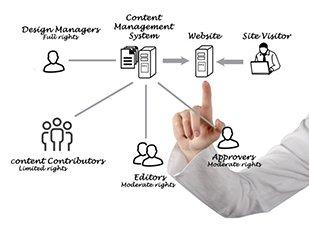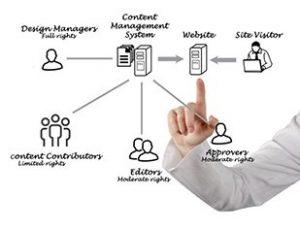WordPress? Sitefinity? Big Commerce? These are all Content Management Systems and if you’re doing research to stand up a new site or redesign/rewrite an existing site then you’ve probably heard of them.
A Content Management System (CMS) is really just a set of already-written code that gives you so
The platform that you choose will always limit you in some way, so it’s good to know what the pros and cons of any given platform are. You’ll want a digital agency that you can depend on to evaluate your unique needs and recommend a platform or perhaps two that will meet those needs. We call this a needs assessment.
A great place to start with a needs assessment is eCommerce. Do you need to accept payments on your site? Are you selling products or services? If you have products, how complicated are they? If you’re selling t-shirts in 3 sizes and 3 colors, almost any system will be adequate. If you’re selling popcorn tins with 3 flavor combinations chosen from 100 different flavors, then that is getting a little more complicated. And, if you’re selling components for a GPS networking system and each component affects the price, and you have to choose component X with options because you’ve already chosen component Y… well, you see what I mean. Complexity can be exponential. A platform that can handle the complexities of your product can be challenging to find. Many platforms allow for custom coding, so even if it can’t handle your complex products right out of the box, it may just take a little (or a lot) of customization.
Another very important piece of a needs assessment can be a content strategy document. This could be done internal to your company, or you can hire a digital agency to create it for you. When we’re working content strategy for a client, we take a long, hard look at the existing content. We look at the user experience on your existing site if you have one. We then put ourselves in your user’s shoes, apply best practices for interface design, and make recommendations for a sitemap, global, primary and secondary site navigation’s, and the most user-friendly way to display various content elements. For example, let’s say you have a construction firm that works many different projects in many different areas. We want your users, who are really your potential clients, to be able to quickly and easily filter through hundreds of projects to find the ones that they are interested in, the ones that are similar to the work they are thinking of hiring you to do. You may want a custom database to make the entry of the data related to a project quick and easy, and to allow for very granular filtering and sorting.
And then there are security and admin permissions. We all know content is king, but who is going to be creating and entering that content? For a small business maybe there’s just one person who needs access to the admin area of the CMS where new pages are created and existing pages are edited, and that one person would be set up with permissions to do all of those tasks. For a larger business there could be a group of folks who are creating content, and then one person who is editing it and publishing it for the world to see. The content creators don’t necessarily need or want the permissions to publish content, but someone in the organization will need that power.
Choosing the right platform for your website and your business will create a solid foundation so that your website can meet your business needs for as long as possible. Partnering with a firm that has experience with different platforms, and leveraging their expertise is a great way to get started.
Save
Save
Save
Save
Save

Allan Todd is CEO of Pagecafe Digital Marketing. In 2022, Allan teamed up with Infront Webworks to provide digital marketing, website design, content marketing, SEO and strategy and solutions to local businesses. Allan lives in Colorado Springs.

